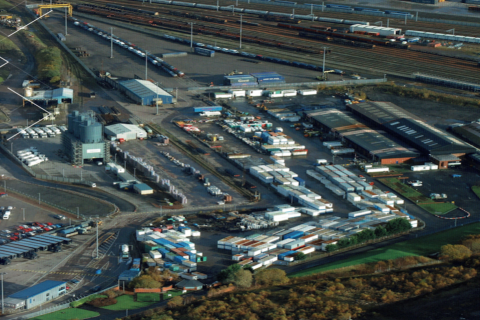Six priorities for the new UK prime minister

The UK Railway Industry Association (RIA) has set out six key priorities for the future of rail, which it is urging new Conservative party leader and de facto prime minister Liz Truss to adopt. Taken together, say the RIA, these priorities would boost economic growth and help answer the government’s economic levelling up agenda; create jobs; and facilitate the UK’s journey towards Net Zero.
The RIA call comes after two challenging years for the industry, with the Coronavirus pandemic impacting both passenger and freight levels on the national network. The association does warn that demand for both passenger and freight journeys is on an upward trend, with passenger numbers frequently hitting over 90 percent of pre-pandemic levels. They say continued government support and investment is essential to ensuring the necessary increase in rail capacity, of both infrastructure and rolling stock, in the years ahead.
A pipeline of work
The RIA has returned to its frequent criticism of the government for failing to provide a clear path forward for the sector. With its membership representing the supply chain, this is a critical point for the representative body. “A pipeline of work is the best way to keep costs down and deliver value for money for the tax and fare payer”, says their submission to the new prime minister. “The industry needs a clear investment plan for Control Period 7 (2024 – 2029), which, allowing for inflation, is funded to at least CP6 levels, as well as publication of the Rail Network Enhancement Pipeline, the last iteration of which was published well over 1,000 days ago.”

Delivery of major rail projects is also a constant issue for the RIA. They say the industry stands ready to deliver transformational rail projects, but it needs commitment from the UK government to ensure the rail supply sector can gear up and ensure it has the capabilities to deliver. “Projects such as HS2, including the Eastern Leg and the Golborne Link (or an effective replacement) need to be delivered in full”, they say, noting the current cancelled state of those tow elements of HS2. “Northern Powerhouse Rail, Midlands Rail Hub, East West Rail and Crossrail 2 all need to be delivered too”, they add to their wish-list.
Urgent need for digital upgrade
Anticipating upheaval during the transition from Network Rail to the new overarching management agency of Great British Railways, the RIA says it is essential that there is no hiatus in current work. “Doing so will ensure projects are delivered promptly and mean that the positive economic impact of the rail industry is maximised”, says the RIA. They cite the urgent need to upgrade almost all of the UK signalling infrastructure to a twenty-first century digital standard. “The industry needs the backing of the government to digitalise signalling”, they say. “Sixty-five percent of current signalling needs to be replaced in the next fifteen years, to exploit digital opportunities to improve customer service.”
With net-zero already baked into government legislation, the RIA wants the new prime minister to commit to decarbonising rail by accelerating electrification, hydrogen and battery trains. “For the industry to phase out diesel-only trains by 2040 and decarbonise the railway network by 2050, it needs a commitment from the government to accelerate plans on rail electrification, as well as support for hydrogen and battery trains on less intensively used parts of the network”, they say. That would make the UK government follow the lead of the devolved Scottish government, who have already begun testing hydrogen powered trains for use in remote parts of north and west Scotland.
Six asks to happiness
“Research and development, innovation funding, and support for its rollout is essential to developing cleaner and more efficient ways of operating the railway”, says the RIA paper. “In particular, there needs to be a focus on the deployment of innovation in order to realise benefits.”
Those views are echoed by the Association’s chief executive. “With passenger numbers and freight back to high volumes, it is clear that rail not only has a bright and prosperous future but can play a key role in helping the wider national economic recovery, in what we know are uncertain times”, said Darren Caplan. “From providing certainty of work to delivering major projects and getting the delivery of GBR right, we urge PM Liz Truss and her top team to make progress on the six ‘asks’ we are setting out. By doing this she can ensure the railway industry gets the support it needs in the coming months, to help it deliver for the UK, its economy and connectivity, in the years ahead.”
Also read:
You just read one of our premium articles free of charge
Want full access? Take advantage of our exclusive offer






Funding of innovations, yes, but what is an innovation, the Shift, worth Name?
Compare, how global devices, even the on road device, upgrade, for higher load – and lower costs, but within industry, just mantra, now is “more funding”…
When spent for “cementing”, at standards, since long not timely, such is worse than devastating…
(A decisive upgrading, a shift – away from technicalities, no longer timely – is requested.)
“Back to basics” calls for a New Old Railway – a paying railway…
Until a Government of any hue realises that the best way to run railways in the 21st century is to put more electrified track on the ground to provide more routeways & encourage diversification for both passenger & freight traffic, we won’t get very far. More diesel & hydrogen trains are not the answer; other bi or tri-modes will help in the interim to give customers what they need rather than what the TOCs think is most profitable.
Joined-up thinking, partnerships, not-for-profit operations, modal shifts – all have a place in bringing down costs, CO2 production & a better service for the long-suffering British public.